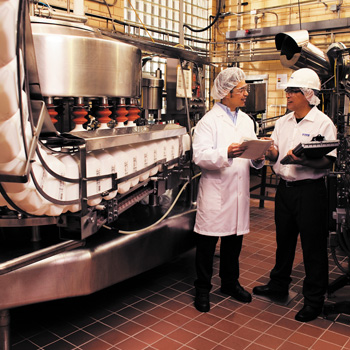With the changes from recent legislation and the numerous, occasionally competing, food safety standards in place, it can be daunting to know how to prepare for a food safety audit. FDA, USDA, GMPs, GFSI, HACCP, SQF, BRC, FSSC, IFS—the alphabet soup of shifting management programs and agency oversight—are enough to alarm even experienced quality assurance professionals.
Though different standards can measure various aspects of the manufacturing and distribution process in different ways, each is designed to improve food safety by reporting and measuring controls and activities such as cleaning, sanitizing and worker hygiene.
Depending on the facility and the standard under which it is being audited, specific requirements and their implementation will vary. However, manufacturers who have strong programs in place should think of audits as opportunities to identify how to further improve operations rather than something to be feared.
A Foundation in Good Manufacturing Practices
One overarching theme found in all of the Global Food Safety Initiative (GFSI)-recognized programs are suitability and cleanability to help assure the floors, walls, ceilings, equipment and personnel do not pose a potential risk to the food being produced. These food safety basics are not new—in many ways, they parallel the requirements published in the Code of Federal Regulations and apply to food manufacturing facilities regardless of whether they fall under regulation by the U.S. Department of Agriculture (USDA) or the U.S. Food and Drug Administration (FDA).
Industry-created standards, such as the GFSI-recognized programs like Safe Quality Food (SQF), British Retail Consortium (BRC), Food Safety System Certification (FSSC) and International Food Standard (IFS), lay out the rules that a manufacturer must follow in order to control the safety and quality of their product. The initial push for implementation and certification against these programs came primarily from the food retail community for their private label products, but in recent years, the push has extended to manufacturers of branded products as well as other players in the food production chain, such as ingredient manufacturers and manufacturers of food packaging materials, which come into direct contact with foods. A manufacturer must first implement the food safety management program and then have it audited and certified by a qualified, external, third party called a certification body. If the audit is successful, the facility is certified for 1 year.
Getting Your Ducks in a Row Before a Certification Audit
You have implemented your program and have completed your internal verification of your program. As you prepare for your certification audit, here are some basic tips that can help you:
• Review the standards – Think of audits like a test in which all of the answers are provided. The standards by which your facility will be judged are clearly laid out, but it never hurts to review them again to see if any have been updated or changed since the last audit.
• Conduct an internal pre-audit – Using a checklist with the latest standards that apply to your operation, schedule a daylong walk through of your facility to observe your processes from start to finish. Have a marked-up copy available for review. Try to look at operations from an outside perspective. Whatever the result of the pre-audit, fix any problems that are noted.
• Document, document, document – Make sure that logbooks, product labels, date stamps, invoices, customer lists and other documents and records PROVE that you can recall products quickly. Be sure to download any logs you might need—some can be modified to address recordkeeping requirements for the audit, but make sure they provide the information needed to show the auditor that you are consistently meeting the standard's requirements and your own internal requirements.
Whatever the standard, Ecolab can help you prepare for an audit. Ecolab can provide public and on-site training and coaching to help ensure that your operation is running safely and efficiently and complying with appropriate standards. Through our Food Safety Institute, we offer classes taught by experienced, registered trainers on how to develop a food safety program to comply with the standard you wish to implement. For more information about training courses or for help preparing for your certification audit, contact us at Foodsafety@ecolab.com.
ecolab.com
Food Safety Audits 101: A Brief History and Preparation Essentials




